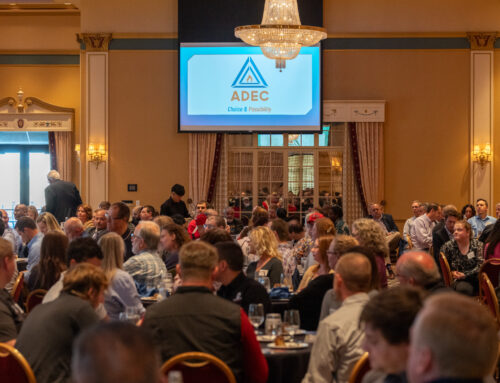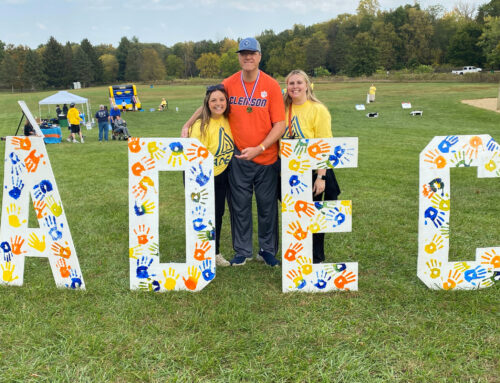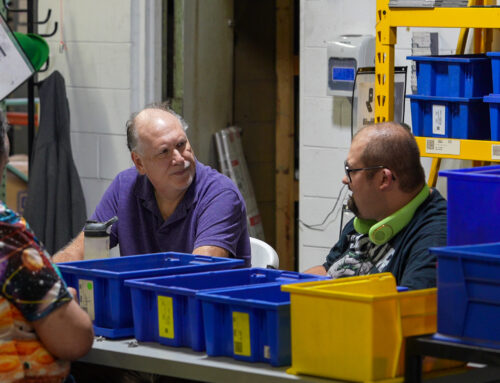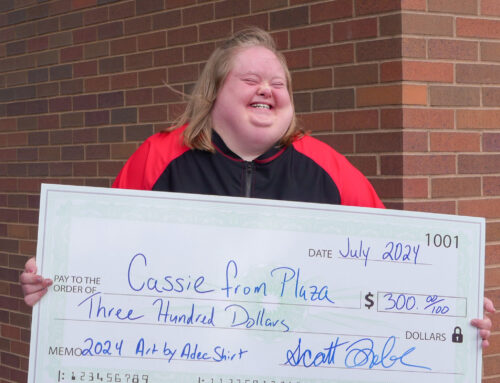Getting married is one of those rites we take for granted. Some prospective grooms still follow tradition and ask fathers for the bride’s hand, but couples don’t really need permission to marry as long as they’re of legal age. If dad says no, they can always elope.
Or can they?
Sadly, permission or ability to marry – to have that storybook experience of falling in love, being courted and overcoming obstacles to live together happily ever after – seems out of reach to many adults with developmental disabilities. Falling in love and getting married, for them, is more like a wishful dream that won’t ever come true. And, trust me, they do dream about it.
True confession. When I first started working at ADEC I was surprised and even, for some odd reason that makes no sense now, a little alarmed to find so much romance in the air among our clients. Having a boyfriend or girlfriend was a big deal, and couples proudly flaunted their togetherness. Alicia wrote about her love for Ben in our writing class. Kevin showed me pictures in his wallet of his girlfriends, all three of them. Patricia let me know Robert was her guy and I better not give him a second look. Steph blushed when talking about Dave. John teared up when he told me he and Deb had been together 10 years. Christine insisted I take a picture of her with her boyfriend Ryan. Among the seniors, it was clear Art went with Betty, even though they lived in separate group homes. Breakups and broken hearts often followed, but then so did new relationships. Everybody seemed to have somebody, at least until 3:30 when the buses rolled in to take them all home.
I often wondered if their need to be part of a couple came from the influences of our society or from an innate desire deep within the human heart to not be alone. I like to think it’s the latter.
I met Darick Stark back in 2008 when he joined the cleaning crew here at ADEC’s Administration Building in Bristol. He’d come in at 5 p.m. to clean my office, greeting me with a smile and the question, “How’re you doing?” He’d tell me about his day, and I’d tell him about mine. He lived with his parents then, but hung out often with friends. He liked music, especially guitar. He hoped to get more hours and a better-paying job than the one he had, although he wasn’t complaining because he was just happy to be working.
Darick graduated from Central High School in 2006 with a Certificate of Completion, missing a diploma by only a 2-point margin on the ISTEP. Diagnosed first as moderately mentally handicapped, he started out in special education, “but I got myself out of that and into regular classes,” he told me. His mom, Christine, said they had to fight every step of the way, first to get the “label” changed to mildly mentally handicapped and then finally to get him enrolled in general education classes in high school. Darick did well in math, earning a B in algebra, but not so well in English. “He has trouble retaining what he’s learned,” his mother explained. “I was so proud of him. He worked so hard, going to night school to finish.”
After high school, Darick tried to find a steady job on his own in fast food service, then retail, then manufacturing, but he didn’t last more than a few weeks at any of them. Once, he thinks, because of a seizure on the job. Other times because of attendance and tardiness. “My alarm didn’t go off,” he said. In 2008, his Vocational Rehabilitation counselor referred him to ADEC’s Employment Services program, where he received job coaching and job placement.
And that’s how he ended up cleaning my office at 5 p.m. on weekdays for about two years. Darick moved from my building to clean offices at Work One in Elkhart, still working for ADEC, but getting more hours and with them, more pay. I didn’t see him as often, so we lost touch.
Then one afternoon I heard the familiar, “How’re you doing?” and looked up to see him standing in my office doorway.
“Hey, Darick, I’m good, how are you?”
“I’m getting married,” he said, grinning.
Darick Stark, 25, met Sylvia Miller, 24, five years ago at Belmont Mennonite Church, where they both attend the young adult group.
“She gave me the evil eye at first,” Darick says. “I don’t think she liked me.”
“That’s just how I am,” Sylvia says. “I don’t say much until I get to know someone.” She looks across the table at Darick and giggles. “I must like you, I’m marrying you aren’t I?”
Darick and Sylvia wear matching sweatshirts with April 30, 2012, imprinted on the front. That’s the date of their first date. They were friends for about three years before becoming boyfriend and girlfriend. He gave her a promise ring a week after their first real date. Four months later, he proposed. She screamed “and almost fell over” before saying yes. The commotion woke up her mother. They will marry June 15 at the church where they met. Darick will sing a solo and play guitar during the ceremony. Sylvia’s family will prepare food for the reception. Sylvia has planned everything herself, choosing colors of pink and blue. She will have two maids of honor. He will have a best man and one groomsman. They will have a junior bride and junior groom, plus a flower girl and ring bearer. The invitations go out soon.
“It surprises me,” Darick said. “I’m surprised what I’m able to do. I thought I’d never be married. I thought I’d be single the rest of my life.”
His mother, Christine, thought that, too. She’s worried about the challenges the young couple faces, but then don’t all mothers worry when their children move out on their own? The two things she worries about most for them are money management and maturity, but she is letting go and having faith that it will all work out.
“I want most of all for Darick to be happy. That is the most important thing to me,” she said. “They love each other, that’s for sure.”
Christine affectionately refers to her son and his fiancé as “the odd couple,” because Sylvia completed a two-year degree at Harrison College and now is enrolled at Ivy Tech, but Darick has only a Certificate of Completion from high school due to his special education placement. “They’re at opposite extremes,” Christine said.
Darick and Sylvia don’t see it that way. They know they complement each other.
“She’s very good at schooling,” he said about her. “She’s helping me get better at things like budgeting money.”
“He’s fun to be with,” she said about him. “He can clean, and I hate to clean.”
Sylvia doesn’t consider Darick “special” in any way other than being special to her. And she knows something about special needs. Her brother, Sean, has autism and lives in one of ADEC’s group homes. Sylvia said she loves Darick, in part, because he reminds her a little of her brother with his sweetness.
“It just works,” she says.
“It works,” agrees Darick. “You just have to pick the right girl. It took me a long time to pick the right girl.”











